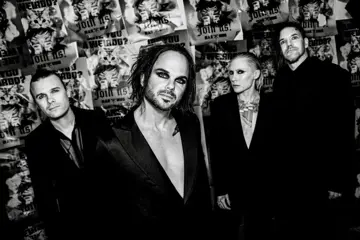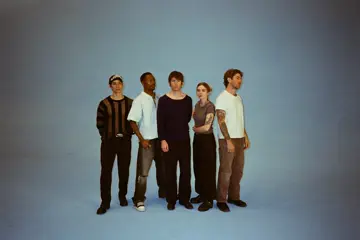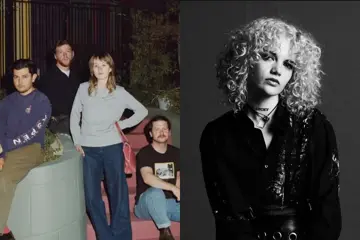In a week in which news trickled out that Richard Linklater, Ethan Hawke, and Julie Delpy had reunited to make another Before Sunrise film – this one Before Midnight, shot in Greece – it's semi-fitting – or, at least, coincidental – that Delpy's latest picture as writer/director/star, 2 Days In New York, opens locally. Delpy's films have obviously used Linklater's model as a starting-point, in their basic conversation-driven set-up, but also their financial model, too. Now, they're taking their serial nature, too; 2 Days In New York the five-years-later follow-on to 2 Days In Paris. Delpy's first film found her and Adam Goldberg as a pair of lovers, coming back to Paris to visit her folks. There was a frisson of verite in the fact that Delpy cast her own parents as her screen parents, and almost all its best moments were derived from that fact; in the genuine eccentricities of her pottering old pops, and the endless natural rapport between this real-life family. Where Linklater was the reference, in truth Delpy's picture owed far more to Woody Allen; if not specifically, at least the general sense of Woody Allenisms (note: this is not a compliment). Meaning: it was all about the duelling neuroses of Goldberg and Delpy, how they wobbled and bumped against each other, how their relationship felt like a series of collisions. The film – in a way that, weirdly, suggested the hand of Delpy's recurring Before character; who may be more like her than we realised – took its neurotics' squabbles not just as comic quirks (although, sigh, there was plenty of that), but as signs of a flawed relationship; Goldberg's jealous douchebaggery not just familiar rom-com tropes, but the kind of toxicity that can poison a relationship. The perfunctory culmination never promised a happily ever after, and, thus, 2 Days In New York walks into that ever-after. Goldberg is absent, now; Delpy, instead, shacked up with Chris Rock, each bringing to their domestic relationship a child from a past relationship. As in the Linklater pictures, the next instalment is about revisiting life at a different point; the 30-something malaise of the trip to Paris – the restless angst of settling down, the parade of past partners now piling up with no fairytale forever in sight – replaced by a more domestic, 40-something milieu of kids and careers. Another of Delpy's directorial efforts, from in between her two 2 Days movies – 2011's The Skylab – was a film torn from Delpy's childhood, a late-'70s-set ensemble-piece about a sprawling family gathering; filled, of course, with resentments and grudges and drunkenness and a gleeful delight in old-fashioned un-PC sentiments.
2 Days In Paris understands this notion of family; and part of its central drama comes from the fact that, as singular entities living isolated lives, a chief resentment of modern citizens in modern relationships is the baggage of family that comes with; and that marriages (or equivalent partnerships) can be undone when a host of others are let in. Sadly, that means, here, when a host of other really annoying characters are let in; Rock opening his door not just to Delpy's drunken dad and exhibitionist sister, but to a stoner blow-in spouting casually-racist bons mots about blackness. This means that this film is, in a most non-Linklaterian way, not about unending philosophical discussions about navigating your way through temporal existence, but about lots of sitcom scenarios in which Delpy, like, momentarily pretends that she has a brain tumour, leading to a series of zany scenes in which she and Rock must pantomime near-death scenarios. There's lots of this kind of mugging, with the filmmaker/star hoping that her anxious, neurotic energy can set the tenor for the whole picture. Whilst it has moments of transient beauty – Delpy's voice-overs are lyrical in a film that is almost never that way, especially when they deal with the spectre of her dead mother – in the most part it's too indebted to Allen to be anything other than an occasionally amusing trifle that is often not. If you're into the fidgety-neurotic stereotype, it might be a pleasant-enough timekiller; me, I would've been happier just waiting out for Before Midnight.

Though published in 1999 and, now, adapted to screen in 2012, The Perks Of Being A Wallflower is set in the dawning days of the '90s; and, aesthetically and textually, it really feels like it. The trailer for the film – which seemed to be playing before every film I've seen for the last three months – made it out to be some kind of Garden State for the next generation of angsty, over-sensitive kids-on-meds. But, in reality, it's far more akin to, like, Degrassi Junior High; making it, I guess, more like some kind of Degrassi High: School's Out for the next generation. Not only is the film rooted in the distant past – that prehistoric era before mobile communications, online-centric lives, and the explosion of micro and social media – but it apes the earnestness of that era's adolescent fictions; back when no one used the word 'tween' and young adult novels were rites of passage dealing with difficult subjects, not fluffy fantasy escapisms involving Chosen Ones and mystical quests. “My life is an after-school special!” laments the film's flamboyant homosexual, who is, glad to say, played by We Need To Talk About Kevin's astonishing Ezra Miller, who does little to dent his budding rep playing the film's most alive and interesting character. And, it's true: he's dating one of the most tired-tropes of earnest teenage melodramas: the closeted star quarterback of the football team who pretends in the hallways not to even know this fag; oh, and, also, the closeted star quarterback of the football team has a hateful and abusive father who beats him after catching the chaps making out. This happens off-screen; as does, in many senses, almost all of the drama. Working from his own epistolary novel, directorial debutante Stephen Chbosky – who adapted the musical Rent to screen, which we should all hold against him forever – has all the narrative happen through the eyes of its narrator, Logan Lerman; the titular wallflower, a nervous freshman struggling to find his way amidst the hateful institutionalism of high-school, all whilst falling for older and generally unavailable Emma Watson, who suffers through a series of jerkwad boyfriends who stage half-committed relationships with her on their own terms; Watson, in case several thousand glossy magazine and Sunday newspaper articles haven't already let you know this, being all grown up and exquisitely beautiful and etc.etc.
As lead, Lerman is, of course, an 'emotionally-troubled' teen, riddled by memories of manic-depressive breakdowns and, it turns out, repressed abuse. The film is about finding yourself, your self-identity, friends who understand you, and so many other staples of coming-of-age-dom; it takes place, all too neatly, across a single school year. But, if the tales of its key cast above didn't hip you, this is really a film about abuse. Posters pasted on city walls have boasted the picture's emotional money-quote – “we accept the love we think we deserve” – turning profundity into an emo tagline, but the sentiment, spoken in two key scenes herein, actually illuminates all that has come around it. And that is people suffering in abusive relationships; being belittled, lied to, shamed, hidden, dismissed, or trivialised, as well as, of course, those grand after-school staples of domestic and sexual abuse. Whilst there's recurring moments of mild levity – you couldn't quite call any of it comedy – for the most part the film is unfailingly earnest, which makes it play perfectly as piece of young-adult entertainment. If the teenage condition is of solipsism, to be so consumed by emotions as if to feel that the whole world closes in on them, then Perks Of Being A Wallflower's melodramatic tenor is pitched at the right register. And yet, set as it is in the early-'90s, it feels just as much about years-on memories of the teenaged experience as much as being in and of it; only freed from the trappings of false nostalgia, of the rosiness of hindsight. It's determinedly old-fashioned and of its era, but it's not as if Chbosky is yearning for simpler times; either in his life, or greater culture. It plays with really big themes —not just abuse, but the passage of time, and, in turn, memory and temporality and mortality – in a really big way. That doesn't make it an impressive piece of cinema, but it makes it undeniably effecting.
Don't miss a beat with our FREE daily newsletter
The MasterChef era has bred an ever-rising tide of haute-cuisine documentaries like Paul Lacoste's Step Up To The Plate (whose French title, Entre Les Bras, certainly isn't such an entry-level pun). It's another film about the behind-the-scenes goings-on at an exclusive eatery; taking a look at three-star'd chef Michel Bras, preparing to secede control of his restaurant to his son – and life-long protégé – Sébastian. Like David Gelb's Jiro Dreams Of Sushi, there's supposed to be greater themes at play; about an occupation defining one's life, about the nobility of daily toil, about fathers and sons and legacies, and food's central place in human existence and all global cultures. Yet, as much as it's of the televised-food-preparation era, director Paul Lacoste certainly isn't some reality-TV-ish hack. Step Up To The Plate is a classic observationist documentary, and, thus, he blessedly knows not to force the emotional tenor; and, more importantly, when to just sit and watch, silently observing the artful preparations of precise, meticulous, immaculately-plated dishes.















